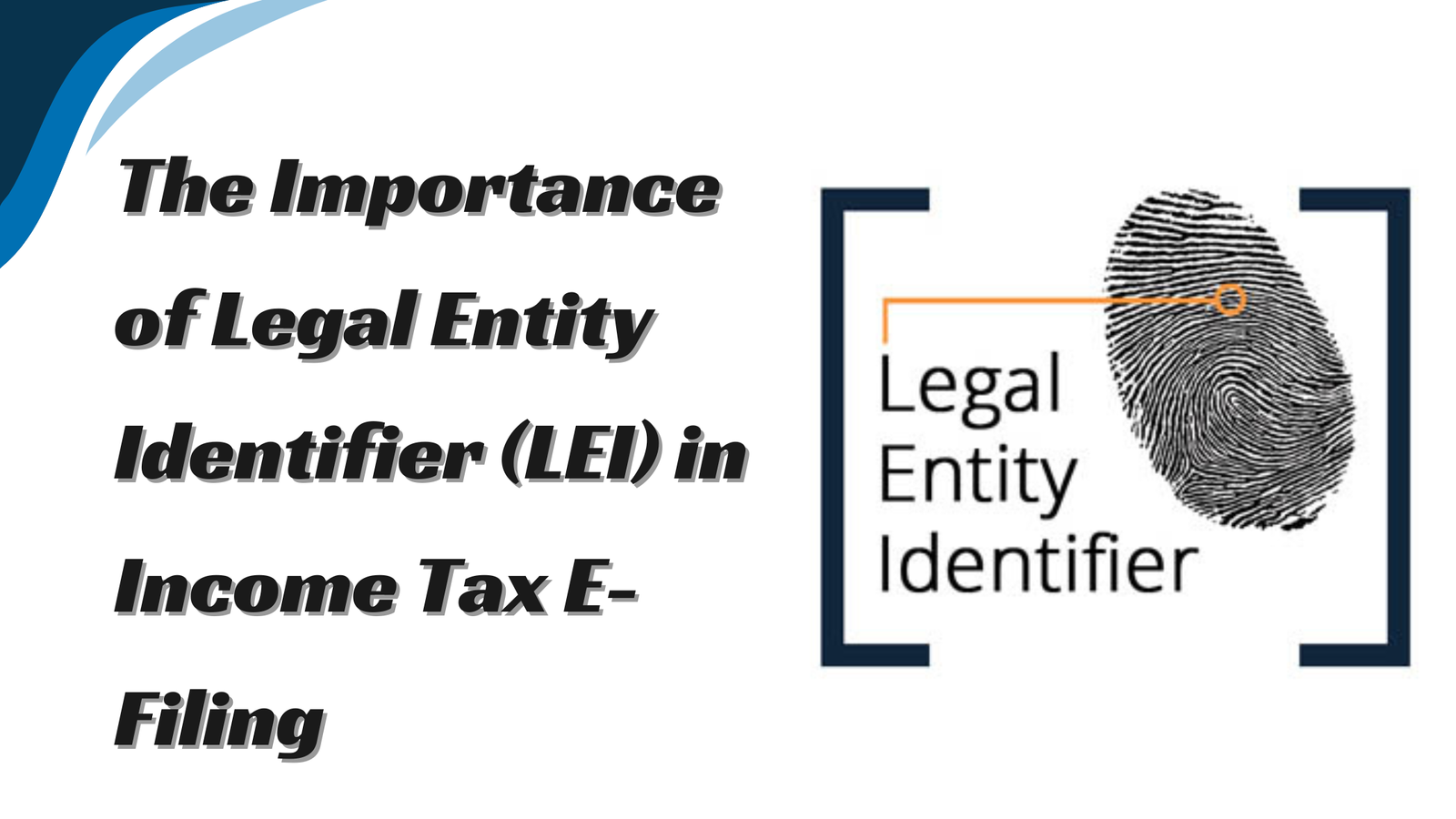Ensuring Hassle-Free Refunds: The Importance of Legal Entity Identifier (LEI) in Income Tax E-Filing
- 1 Introduction to Legal Entity Identifier (LEI)
- 2 Eligibility and Requirement
- 3 Benefits of Legal Entity Identifier (LEI)
- 3.1 Enhanced Transparency and Risk Management:
- 3.2 Streamlined Regulatory Reporting:
- 3.3 Facilitates Straight-Through Processing (STP):
- 3.4 Enables Global Entity Identification:
- 3.5 Supports Financial Stability and Crisis Management:
- 4 Documentation and Submission Process
- 4.1 Simplified Entity Identification:
- 4.2 Enhanced Data Accuracy:
- 4.3 Facilitated Regulatory Compliance:
- 4.4 Improved Efficiency in Transaction Processing:
- 4.5 Global Interoperability:
- 5 Compliance and Impact
- 6 Conclusion
As the digital transformation of India’s tax ecosystem continues to evolve, introducing the Legal Entity Identifier (LEI) has become a crucial aspect of the income tax e-filing process. This unique identifier facilitates hassle-free refund processing, particularly for non-individual taxpayers. This comprehensive guide will delve into the significance of the LEI, its eligibility criteria, the benefits it offers, and the steps involved in submitting the required information during income tax e-filing.
Introduction to Legal Entity Identifier (LEI)
The Legal Entity Identifier (LEI) is a 20-character alphanumeric code uniquely identifying legal entities participating in financial transactions. This global standard, endorsed by the G20 and implemented by the Reserve Bank of India (RBI), aims to enhance transparency and mitigate risks in the financial system. In income tax e-filing, the LEI has become a crucial requirement for non-individual taxpayers seeking to receive tax refunds exceeding Rs—50 crore.
Eligibility and Requirement
The Legal Entity Identifier (LEI) requirement applies to non-individual taxpayers, such as companies, partnerships, trusts, and other legal entities. According to the RBI’s regulations, the LEI is mandatory to credit tax refunds exceeding Rs. 50 crore to ensure efficient and error-free processing. This measure aims to enhance transparency and facilitate seamless transactions between the Income Tax Department and non-individual taxpayers.
Benefits of Legal Entity Identifier (LEI)
The adoption of the Legal Entity Identifier (LEI) in income tax e-filing offers several benefits for non-individual taxpayers:
Enhanced Transparency and Risk Management:
One of the primary benefits of LEIs is their role in enhancing transparency in financial markets. By assigning a unique identifier to each entity, LEIs facilitate more accurate and efficient tracking of financial transactions. This transparency helps regulators, financial institutions, and other stakeholders better understand the interconnectedness of entities within the economic system. Additionally, LEIs aid in assessing and managing risks associated with counterparty exposure, credit risk, and systemic risk.
Streamlined Regulatory Reporting:
Financial institutions’ compliance with reporting requirements is a top priority in an era of increasing regulatory scrutiny. LEIs simplify regulatory reporting by providing a standardized identifier that can be easily referenced across different reporting frameworks and jurisdictions. Financial regulators worldwide are increasingly mandating the use of LEIs in various reporting requirements, including derivatives transactions, securities trading, and cross-border payments. By streamlining reporting processes, LEIs help reduce compliance costs and improve the accuracy of regulatory filings.
Facilitates Straight-Through Processing (STP):
STP refers to the automated processing of financial transactions from initiation to settlement without manual intervention. LEIs play a crucial role in enabling STP by providing a standardized identifier that can be integrated into automated systems and workflows. By incorporating LEIs into transactional data, financial institutions can improve the efficiency and speed of processing while reducing the risk of errors associated with manual data entry.
Enables Global Entity Identification:
Accurate entity identification is essential for conducting cross-border transactions and managing international risks in an increasingly globalized financial landscape. LEIs provide a globally recognized standard for identifying entities, irrespective of location or jurisdiction. This universality makes it easier for counterparties to identify and verify each other’s identity, facilitating smoother cross-border transactions and mitigating the risk of fraud and money laundering.
Supports Financial Stability and Crisis Management:
Identifying and assessing interconnected entities’ exposure is crucial for maintaining economic stability during financial crises or systemic stress. LEIs enhance the monetary system’s resilience by providing regulators and policymakers with timely and accurate information on the network of relationships between entities. This information enables more effective crisis management, including identifying systemic risks, implementing targeted interventions, and coordinating regulatory responses across jurisdictions.
Documentation and Submission Process
To submit the Legal Entity Identifier (LEI) details during income tax e-filing, non-individual taxpayers need to follow a straightforward process:
Simplified Entity Identification:
One of the primary benefits of LEIs in documentation and submission processes is simplified entity identification. Instead of relying on disparate identification methods that vary across jurisdictions, financial institutions, and regulatory bodies, LEIs provide a standardized and globally recognized identifier. This simplification reduces the complexity of documenting and verifying entity identities, streamlining processes for financial institutions and regulatory authorities.
Enhanced Data Accuracy:
LEIs significantly improve data accuracy in documentation and submission processes by assigning a unique identifier to each entity. Inaccurate or incomplete entity information can lead to delays, errors, and compliance issues. LEIs mitigate these risks by providing a standardized reference point that ensures consistency and accuracy across various financial transactions and reporting requirements. Financial institutions can rely on LEIs to verify entity identities more efficiently, reducing the likelihood of data discrepancies and errors.
Facilitated Regulatory Compliance:
Compliance with regulatory requirements is a top priority for financial institutions operating in today’s highly regulated environment. LEIs are crucial in facilitating regulatory compliance by providing a standardized identifier that can be easily referenced in regulatory reporting and documentation. Many regulatory authorities worldwide mandate using LEIs in various reporting frameworks, including derivatives trading, securities transactions, and cross-border payments. By incorporating LEIs into their compliance processes, financial institutions can streamline reporting and documentation, reducing the risk of non-compliance and associated penalties.
Improved Efficiency in Transaction Processing:
Besides regulatory compliance, LEIs enhance transaction processing efficiency by facilitating straight-through processing (STP). STP refers to the automated processing of financial transactions from initiation to settlement without manual intervention. By incorporating LEIs into transactional data, financial institutions can automate the identification and verification of counterparties, reducing processing times and operational costs. This automation improves the speed and accuracy of transaction processing, enabling financial institutions to handle larger volumes of transactions with greater efficiency.
Global Interoperability:
LEIs offer global interoperability, allowing entities to be identified and verified consistently across different jurisdictions and financial markets. This interoperability is essential for entities engaged in cross-border transactions, as it ensures that entity identities remain consistent and verifiable regardless of geographical location. Whether conducting business locally or internationally, entities can rely on LEIs to streamline documentation and submission processes, reducing friction and complexity in global financial transactions.
Compliance and Impact
Compliance with the Legal Entity Identifier (LEI) requirement is a regulatory obligation and a strategic move to ensure efficient and hassle-free refund processing. Failure to submit the LEI details or any discrepancies in the information provided can lead to delays or complications in the credit of refunds exceeding Rs—50 crore.
Conclusion
Introducing the Legal Entity Identifier (LEI) in the income tax e-filing process is a significant step towards enhancing transparency, streamlining refund processing, and aligning India’s tax ecosystem with global best practices. By understanding the importance of the LEI and proactively submitting the required information, non-individual taxpayers can ensure a seamless and hassle-free refund experience. As the digital transformation of the tax landscape continues, embracing the LEI requirement will become increasingly crucial for maintaining compliance and optimizing the tax filing process.

















